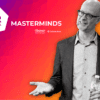
Beyond the 4-Day Work Week: Designing Workplaces for Personalization and Growth
today2023.04.26. 510

WHY SHOULD YOU CARE?
In a world where the future of work is constantly changing, it’s important to take a step back and ask ourselves some fundamental questions about our work and our lives. In this thought-provoking blog post, we explore the connection between a solid philosophy of work and the necessary encounter with existential questions, and suggest a new approach to enable dialogic development in the workplace.
Today’s world is abuzz with discussions regarding the future of work and ways in which we can enhance it. This morning, when I opened up my LinkedIn I came across a thought-provoking post by Otti Vogt, which has opened up Pandora’s box with plenty of insightful comments.
In this post, Otti suggests that there is an underlying positive psychology dogma that stresses increased freedom, well-being, authenticity, meaning, and pleasure within work lives; with an ultimate aim of helping each person self-actualize, self-improve authentically creative and innovatively; yet no regular job can accommodate such high degrees of personalization – leading to questions such as whether we are simply using big words to make mundane activities sound more desirable for employees; plus few people know exactly what their individual desires truly are – something positive psychology dogma has always advocated against.
To connect the “Future of Work” discussion to basic philosophical issues, a robust philosophy of work and life is needed. Without it, our passionate debate about organizational transformation becomes irrelevant and pointless. Additionally, the fact that most adults remain uncertain as to their true desires should not lead them down the path to depression; perhaps their lack of clarity indicates they are taking worthwhile steps towards change; perhaps the great transformation we seek may not involve work at all but rather involves us – perhaps it involves confronting existential questions such as why are here, who we are, and where are heading.
Therefore, success may not simply mean equipping people to face artificial intelligence (AI) and robotics, improving processes more efficiently, or redistributing work and its proceeds. Nor may it simply involve creating more innovative, agile, participative workplaces; nor even psychologically safe or authentic ones. Perhaps success lies instead in encouraging dialogic development – something leaders cannot simply hand off to followers nor just in giving people autonomy or becoming democratic and prosocial; instead, it requires guided and reciprocal cultivation of identity and character through work.
Jon Ingham, the director of Strategic HR Academy suggested in a comment an integrated approach may be required to meet people’s needs while providing desired results for other stakeholders. Although most individuals would likely engage in similar activities five days per week, individuals should have the freedom to tailor what and how they are doing it to achieve their own personal goals – personalization is vitally important and organizations must help facilitate clarity around such goals.
Dimi Yar, VOSA Founder and CEO, who is, according to his LinkedIn profile, “focused on Fixing Capitalism”, suggested that employees should take ownership and responsibility for finding meaning in their work, with employers should take ownership and responsibility for providing an environment that allows for self-actualization of their employees. He said: “We are setting the bar too high with such discussions, and need to keep it closer to the basics. Work is just a continuation of education. Both contain a social element. Neither are designed to provide deeper meaning. Education is about learning and finding what you like and what you are good at. That’s 50% of IKIGAI. Work provides the other 50% through actualization and mastery. Meaning is within.”
As the president of ICF Slovenia Chapter, Teja Breznik Alfirev, PCC suggested, one approach to address all the issues discussed above is what Robert Kegan and Lisa Laskow Lahey refer to as a Deliberately Developmental Organization (DDO). Most organizations invest a lot of their efforts in covering up weaknesses, which is an ineffective use of potential and leads to an issue known as not knowing what you really want. Finding your desired goals may seem impossible when your daily priorities include image management and other survival strategies. “Better than 4+1 week is to design the organizational culture where people development is part of the everyday operation and working life.” – she added. But beyond this, developing the mindset that our world serves as an arena to expand consciousness can only enhance results further.
“Better than 4+1 week is to design the organizational culture where people development is part of the everyday operation and working life.”
Teja Breznik Alfirev, PCC
Current discussions surrounding the future of work emphasize personalization, authenticity, and meaning in the workplace. Yet without an effective philosophical basis for work and life relationships, this discussion is likely futile; simply making work more pleasurable or fulfilling will not allow dialogue development to happen through work alone.
At its heart, the transformation we seek is not only about work but about ourselves as individuals. It involves facing some of life’s deepest existential questions: “Why am I here, who am I, and where am I headed?” Organizations can assist individuals in answering these questions by creating an environment of dialogic development and continuous improvement – such as through providing dialogic development training or cultivating an environment conducive to continuous improvement – and through supporting dialogue development or providing continuous improvement workshops – helping answer those existential queries while finding fulfillment in work – perhaps with a 4+1 day workweek where one day can be set aside solely to personal development or exploration!
Future work should not simply focus on improving processes or redistributing work; rather, we need to foster personal development. By providing an environment in which individuals can explore their true desires and potential freely, we can foster a more fulfilling and productive workplace for all.

Written by: Mihaly Nagy
Culture Employee Experience Future of Work Leadership
Previous post

- 1376
labelArticles today2023.04.25.
Unleashing the Power of Employee Engagement Data: Expert Strategies for Transforming Your Organization
WHY SHOULD YOU CARE? Employee engagement is critical to the success of any organization, yet many struggles to harness the power of their engagement data. By focusing on process leadership, [...]
Similar posts

labelArticles today2024.10.21.
The success-recipe to build agile and future-ready organizations in 2025 and beyond







Post comments (0)